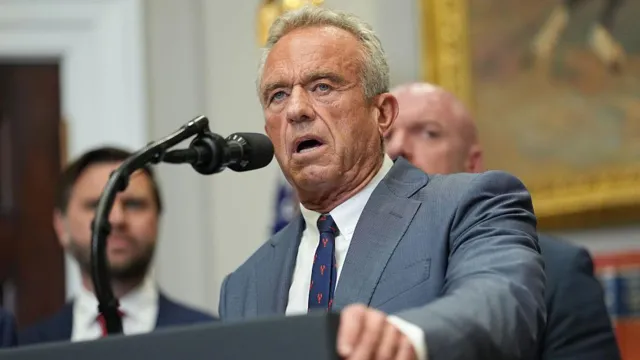The United States Department of Health and Human Services has announced plans to withdraw $500 million (£376m) in funding allocated for the development of mRNA vaccines designed to combat respiratory viruses such as influenza and COVID-19.
This move will affect 22 research projects, including efforts by pharmaceutical giants Pfizer and Moderna, which had been working on vaccines to address threats like avian flu and other viral infections, according to the department.
The decision was revealed by Health Secretary Robert F Kennedy Jr, who has gained notoriety for his scepticism toward vaccines.
Kennedy justified the cut, stating, “mRNA technology poses more risks than benefits for these respiratory viruses.”
Kennedy’s remarks have sparked backlash from health professionals, many of whom have long criticized his anti-vaccine stance.
Peter Lurie, a former official at the US Food and Drug Administration, condemned the funding halt, telling the BBC it represents the US “turning its back on one of the most promising tools to fight the next pandemic.”
He credited mRNA technology with playing a vital role in curbing the COVID-19 pandemic and saving millions of lives.
Kennedy, however, defended the move, asserting that his administration had “reviewed the science, listened to the experts, and acted.” He claimed, “[T]he data show these vaccines fail to protect effectively against upper respiratory infections like COVID and flu.”
He further argued that mRNA vaccines may “encourage new mutations and can actually prolong pandemics as the virus constantly mutates to escape the protective effects of the vaccine.”
Public health experts have refuted such claims, explaining that viral mutations occur naturally, with or without vaccines.
Director of the Vaccine Education Center at Children’s Hospital of Philadelphia, Dr Paul Offit, emphasized that the flu virus, for instance, mutates annually regardless of vaccination efforts.
Describing mRNA vaccines as “remarkably safe,” Dr Offit said they are essential tools for protecting against severe disease caused by viruses such as COVID-19.
He added that discontinuing support for the technology could place the nation in a “more dangerous” position when confronting future pandemics, noting their rapid development timeline as a crucial advantage.
The Biomedical Advanced Research and Development Authority, which oversees vaccine innovation under HHS, will now redirect its focus toward vaccine platforms with “stronger safety records and transparent clinical and manufacturing data practices,” the department said.
Unlike traditional vaccines that rely on inactivated viruses, mRNA vaccines instruct cells to produce proteins that prompt immune responses.
Moderna and Pfizer’s mRNA vaccines underwent rigorous clinical testing involving thousands of participants and were deemed safe and effective.
Since assuming office, Kennedy has taken significant steps to overhaul vaccine policy in the US.
In June, he dismissed all 17 members of the advisory committee responsible for national immunization guidelines and replaced them with individuals known for questioning vaccine safety and effectiveness.
He also removed the COVID-19 vaccine from the Centers for Disease Control and Prevention’s recommended immunization schedule for healthy children and pregnant women.
